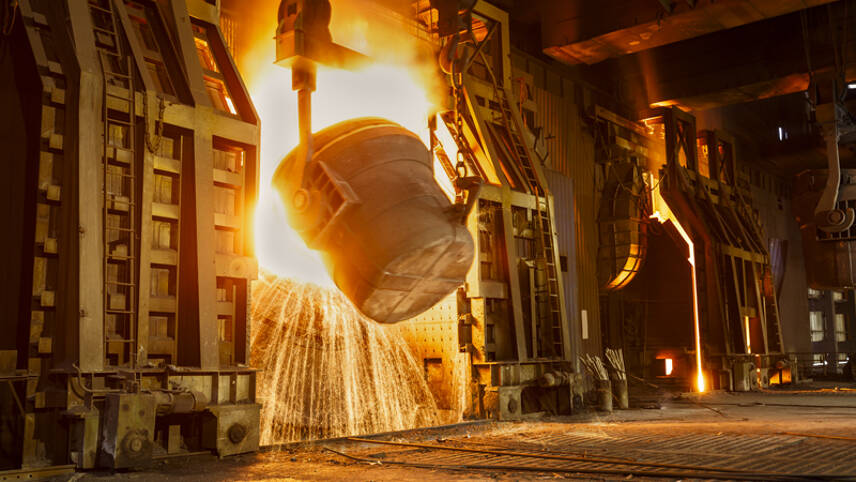Register for free and continue reading
Join our growing army of changemakers and get unlimited access to our premium content

Earlier this year, 250 business leaders from eight high-carbon, hard-to-abate sectors were polled for the We Mean Business Coalition’s Corporate Climate Stocktake, supported by the Climate Champions Team and Bain & Company.
The results haver been published today (31 October) and paint a picture of progress and pain points relating to the low-carbon transition in power, road transport, concrete and cement, steel, shipping, agriculture, aviation and hydrogen.
Across all sectors, three in ten of the business leaders surveyed said they do not expect their organisation to end fossil fuel use entirely before 2050, despite the majority of them having set net-zero targets for 2050 or sooner.
The sectors least optimistic of a rapid fossil fuel phase-out are shipping and concrete and cement. The most optimistic sector is road transport, where half of respondents expect to transition entirely away from fossil fuels by 2040.
In power, while more than four in ten respondents expect to transition by 2040, almost three in ten expect the transition to come after 2050.
These plans are potentially misaligned with the Paris Agreement. The International Energy Agency (IEA) recently updated its roadmap for a global energy transition aligned with net-zero by 2050 and the Paris Agreement’s 1.5C pathway.
Among the key points included in the roadmap are an end to the development of all unabated coal-fired power plants as soon as possible, coupled with an end to new coal mine development and coal mine expansion. There is also a near-immediate halt to all upstream oil and gas expansion projects with long lead times.
The IEA’s pathway includes all nations bringing coal-fired electricity generation offline by 2040 – far sooner in wealthier nations less dependent on the fuel. Declines in oil and gas use compound this, meaning that global fossil fuel demands are 80% lower than they are at present.
According to the IEA, the sectors polled for the Corporate Climate Stocktake will need to explore electrification as well as energy efficiency and alternative fuel innovations. The IEA foresees electricity accounting for around half of industrial energy demand in 2050, up from around a fifth at present.
Clear policy signals
The Corporate Climate Stocktake also asked business leaders to identify the forces driving the energy transition.
More than one-third (37%) identified consumer pressure as a factor and a quarter (25%) cited pressure from investors. This evidences a growing perception of bottom-up pressure.
Nonetheless, top-down pressure remains the key driving factor. 73% of the companies surveyed see government regulation as the biggest factor in influencing the pace of the energy transition.
The report outlining the survey findings gives several examples of major energy-related policy interventions from the past two years, including the US’s Inflation Reduction Act and EU’s Net-Zero Industry Act, both created to scale domestic cleantech value chains.
But it notes that “for many” businesses, accelerating clean energy investment still leads them to run into policy barriers that limit the availability of suitable low-carbon solutions. For example, in markets such as Japan, entering a renewable Power Purchase Agreement (PPA) is nigh on impossible. Many markets are not properly preparing to scale domestic production of alternative fuels even if they are well-placed to do so.
Bain & Company partner Katherine Dixon writes in the report, on the topic of clear green policy and regulation: “By placing the responsibility on businesses to reconcile the tension between climate action and commercial interests, we are asking for failure.”
We Mean Business Coalition chief Maria Mendiluce said: “When I meet with business leaders, I hear their desire to accelerate the adoption of clean energy and technologies and a frustration that more is not being done to remove the barriers to scaling up clean solutions in their sectors and value chains.
“The Stocktake captures evidence from business leaders at the forefront of driving change in their industries: to understand the pace of change in each sector, the barriers they are facing, and what our most ambitious companies need from governments to go faster. Now we need to use these insights to shape policies that support businesses and sectors to reach net zero at the pace required by science.”
The hope is that the shaping of some of these policies can take place at COP28, which begins in Dubai in late November.
Mendiluce recently penned an exclusive op-ed for edie on how businesses can advocate for stronger international agreements on the energy transition. Read it here.


Please login or Register to leave a comment.